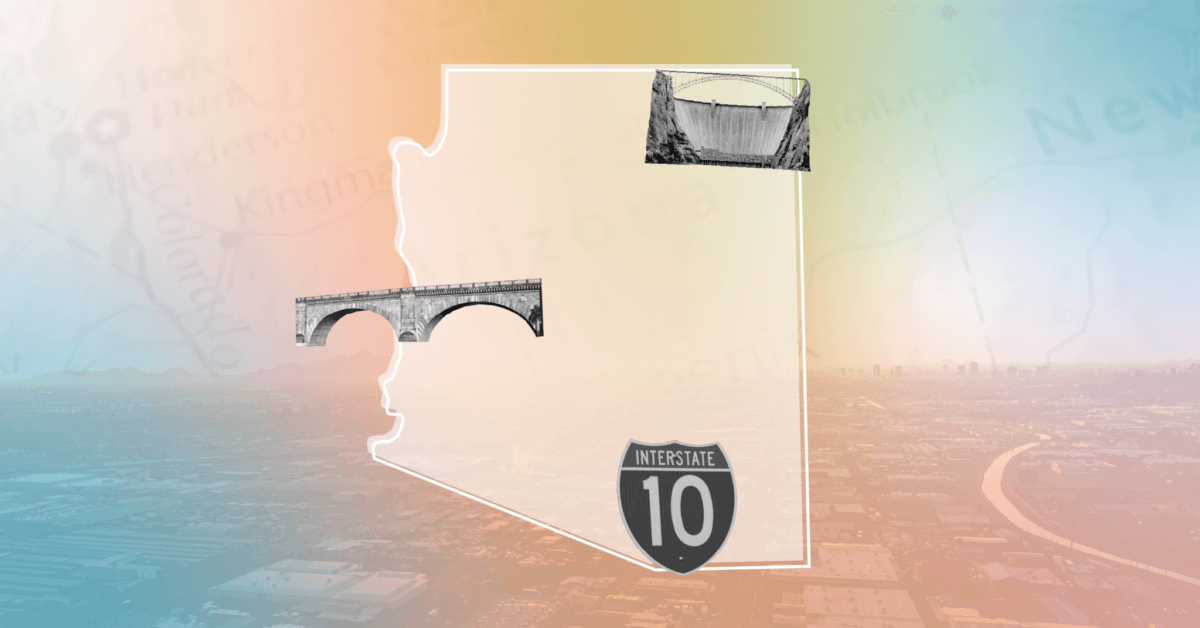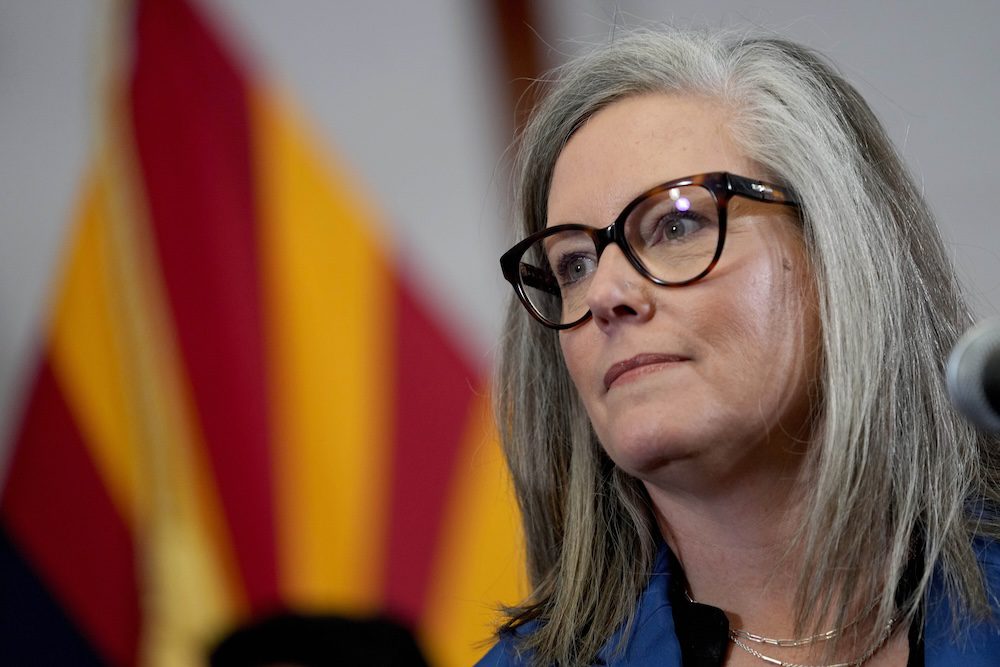
Graphic by Francesca Daly
In 2021, President Biden signed the historic $1 trillion infrastructure bill into law, delivering on a key piece of his economic agenda. Since then, billions of dollars have been funneled into all 50 states in order to upgrade highways, transit systems, water systems, and more.
In Arizona, $3.4 billion in funding has been announced so far, and more is on the way. Here’s a look at the work that’s being done in the Grand Canyon State and how it helps Arizonans.
Roads, Bridges, and Public Transit
In Arizona, there are 132 bridges and over 3,193 miles of highway in poor condition. According to the White House, $2.2 billion in funding from the law has been allocated to Arizona roads, bridges, roadway safety, and other major projects as of February.
There are over 5 million licensed drivers in the state of Arizona, according to the Department of Transportation. According to TRIP, a national transportation research nonprofit, it’s estimated that Arizona’s deteriorated roads and bridges cost these drivers a total of $3.6 billion per year.
As these roads and bridges improve, the average motorist will spend less in additional vehicle operating costs (VOC). These costs are a “result of driving on rough roads, the cost of lost time, and wasted fuel due to congestion, and the financial cost of traffic crashes.”
One effort aimed at improving Arizona’s roads and bridges is the RAISE program. Grants awarded through this program “help project sponsors at the state and local levels, including municipalities, tribal governments, counties, and others complete critical freight and passenger transportation infrastructure projects.”
So far, $75.3 million has been awarded in Arizona through this program. One project in Arizona being funded by the program is the reconstruction of a 10.5-mile section of Mohave Road on the Colorado Indian Reservation in La Paz County.
Arizona is also getting funds from the INFRA program, which awards grants for freight and highway projects that “improve the safety, efficiency, and reliability of the movement of freight and people in and across rural and urban areas.”
The city of Flagstaff is getting $32.5 million from the INFRA program, which it will use to construct pedestrian underpasses along the City’s Downtown Mile to make it easier for residents to reach downtown Flagstaff by foot. The funds will also go towards upgrading freight and passenger rail infrastructure along a one-mile segment of the Burlington Northern and the Santa Fe Southern Transcontinental Corridor in the city.
Officials have said that this project is the “biggest transit investment in the city in years.”
Arizona has also been allocated $174.9 million to improve public transportation options across the state in fiscal years 2022 and 2023. This funding will most directly affect non-white households, which are two times more likely to commute via public transportation in the state of Arizona.
Clean Buses, Energy, and Power
The Bipartisan Infrastructure Law is also set to invest billions of dollars into clean public transit and school buses over the next five years. Half of that money will be used to replace existing school buses with zero-emission and low-emission models. Clean-energy buses reduce greenhouse gas emissions that drive climate change and will also reduce health risks among children and the surrounding communities.
To date, Arizona has been awarded $11.4 million from the Environmental Protection Agency’s Clean School Bus Program, which provides school districts rebates to replace existing school buses with clean and zero-emission models to reduce harmful emissions from older buses. Eight communities in Arizona received grants thanks to the program, including Phoenix and Keams Canyon.
The Phoenix Public Transit Department, the Sun Tran public transit system in Tucson, and Tucson’s Sun Van paratransit agency were also separately awarded $28.5 million to improve bus service and clean transit buses through the Department of Transportation’s Low or No Emission Vehicle Program.
The infrastructure law is also set to upgrade the power infrastructure by “making the grid more resilient and building thousands of miles of new transmission lines to deliver clean, affordable electricity.” There’s additional funding to weatherize homes to improve their energy efficiency. This would lower energy costs for impacted households by an average of $372 per year, according to the Department of Energy.
Airports, Ports, and Waterways
To date, Arizona has received approximately $83.9 million for replacing and modernizing airport infrastructure at airports including the Phoenix Sky Harbor International Airport, which received over half of the funds, and the Phoenix-Mesa Gateway Airport.
According to the White House, this will help the United States become more competitive economically and create jobs. And as Airport World, the magazine of the Airports Council International, notes “ensuring that an airport has the necessary infrastructure to support the desired level of air service, including terminal facilities, runways, taxiways and air traffic control systems are crucial for being able to accommodate growth in passenger demand.”
The state’s ports and waterways are also in dire need of investment. Roughly $935,000 has been allocated to Arizona so far so that the state can address maintenance backlogs and reduce congestion and emissions near ports such as the ones in Yuca and Gila Bend. Ultimately, this will help the US move goods more quickly, at a lower cost.
Water
There’s no arguing that clean drinking water is essential. The Bipartisan Infrastructure Law represents the largest investment in clean drinking water in American history, including the first-ever dedicated federal funding to replace lead service lines and address dangerous PFAS chemicals, according to the White House.
As of February, $234 million in funds have been allocated for Arizona to provide residents with clean and safe drinking water.
Roughly a fifth of these funds are going towards lead pipe and service line replacement throughout the state. According to the National Resources Defense Council, there are roughly 12,000 lead service lines in the state of Arizona.
Another $32.4 million will also go towards safe drinking water investments.
Internet
In the modern world, access to the internet is not only necessary, but crucial for Americans to be able to do their jobs, go to school, access health care, and stay connected with family and friends. Yet, nearly 22% of Arizonans do not have an internet subscription, according to the Benton Institute for Broadband & Society. Under Biden’s infrastructure law, Arizona will receive a minimum allocation of $100 million to help ensure high-speed internet access across the state.
Experts also estimate that over a million households in Arizona are eligible for the Affordable Connectivity Program (ACP), although only 377,981 households are enrolled so far. This program cuts internet bills by up to $30 per month, or $75 for households on tribal lands. It also provides a one-time $100 discount off a connected device.
In addition to the above measures, the Biden administration is working with internet providers to offer high-speed internet plans that are fully covered by the ACP. This means that most eligible households in Arizona would be able to get high-speed internet for free.
Electric Vehicles
Electric vehicles are quickly becoming a way of life for many Americans. While just 7% of U.S. adults say they currently own an electric or hybrid vehicle, according to the Pew Research Center, about 39% of Americans say that the next time they purchase a vehicle, they are at least somewhat likely to seriously consider electric.
The infrastructure law has so far allocated $27.6 million in 2022 and 2023 to Arizona to build out a network of EV chargers across the state. Reducing gas emissions by transitioning to EVs is crucial to addressing the climate crisis, and that transition will create a crucial supply of new domestic manufacturing jobs, according to the White House.
Arizona can expect to receive roughly $76 million over five years to support the expansion of electric vehicle charging.
Resilience and Legacy Pollution Cleanup
More broadly, one of the main aims of the Bipartisan Infrastructure Bill is to address the climate crisis. Thousands of former industrial, chemical, and energy sites emit harmful pollutants into surrounding communities across the country and disproportionately impact communities of color.
The infrastructure law is set to reclaim abandoned mines, cap orphaned oil and gas wells, and clean up Superfund sites, which are areas that have been contaminated by hazardous waste being dumped, left out in the open, or otherwise improperly managed. As of February, 9 sites in Arizona were listed on the Superfund National Priority List, although none of them have received any funding from the infrastructure law yet.
To date, Arizona has been allocated approximately $75.1 million for improving “infrastructure resilience.” This investment will help the state work against pressing challenges like the impacts of climate change, extreme weather events, and more.

New rules for using purified wastewater give Arizona cities more options
PHOENIX – With dwindling water supplies, cities throughout Arizona are exploring multiple ways to meet residents’ water needs. In March, the Arizona...

Opinion: Secretary Kennedy should release energy assistance funding for families
US Health and Human Services Secretary Robert F. Kennedy Jr. recently fired the entire staff that manages the Low-Income Home Energy Assistance...

Arizona agency takes action to regulate groundwater use in rural southeast
It's necessary to regulate groundwater in Arizona's rural southeast, allowing the designation of a controlled area to stop rapid depletion of the...

Valley Metro changed its fare system: Here’s what you need to know
Valley Metro has gone paperless, so now all buses and light rail stations only accept a new “Copper Card,” or mobile fare via QR-code in a...




